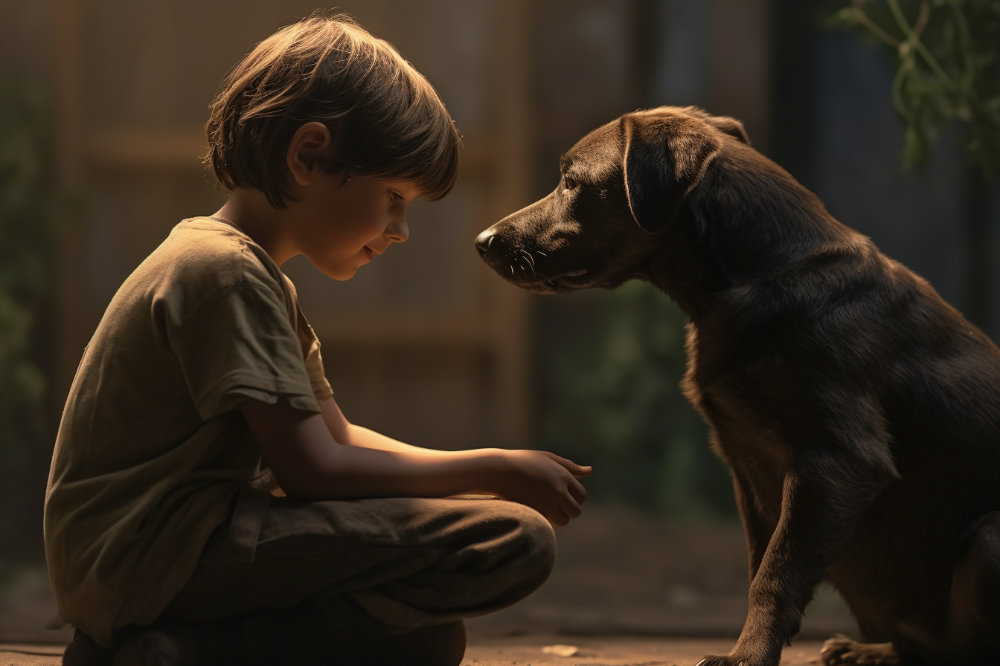We all know pets are not just animals. They’re like our best friends or even like brothers and sisters. They’re there when we’re happy, they’re there when we’re sad, and they’re even there for our everyday boring stuff. That’s what makes our friendship with them super strong. They love us no matter what, hang out with us, and make us feel important. That’s why we feel very close to them.
When our pet is no longer with us, it feels like we lost a close friend. It really hurts and can make us feel very sad. When a pet passes away, we’re not just missing an animal. We’re missing a friend, a play buddy, and a part of our everyday routine. We also lose a source of love and support. This can make us feel alone or even confused. Understanding why we feel this way can help us realize why dealing with losing a pet can be really hard.
Understanding Pet Loss Grief
Grief is the big bunch of feelings we get when we lose someone or something we love. When we lose a pet, we feel grief too. It can make us feel really sad, angry, confused, or even guilty. Grief is normal, and it’s part of dealing with loss.
The Stages of Grief After Pet Loss
When we grieve, we usually go through different stages. Not everyone will feel all these stages or in this order, but here they are:
- Denial and disbelief: This is when we can’t or don’t want to believe our pet is gone.
- Anger: This is when we may feel mad at ourselves, others, or even at our pet for leaving us.
- Bargaining: Sometimes we might make promises or deals in our head if only we could have our pet back.
- Depression: This is when we feel really sad and might not want to do things we usually enjoy.
- Acceptance: This is when we start to get used to the idea that our pet is gone and figure out how to move on.
Common Emotions When Dealing with Pet Loss

Denial and Disbelief
At first, it might be hard to believe that your pet is really gone. You might expect them to greet you when you come home or to be there when you wake up. This is called denial, and it’s a common first reaction to loss.
Guilt and Regret
Sometimes, we might feel guilty or wish we had done things differently. Maybe you wish you had spent more time with your pet or noticed if they were feeling sick. It’s important to remember that you loved your pet and did the best you could.
Anger
You might feel angry after losing your pet. Maybe you’re mad at yourself, the vet, or even your pet for getting sick and leaving you. It’s okay to feel angry. It’s a normal part of grieving.
Depression
Depression means feeling really sad for a long time. You might not want to hang out with friends or do fun things. It’s normal to feel this way when you’re grieving. But if it lasts a long time or feels too hard to handle, it’s a good idea to talk to a trusted adult about it.
Acceptance
This is when you start to feel a bit better. You begin to accept that your pet is gone and start thinking about the good times you had together. You never stop missing them, but it becomes a bit easier to handle over time.
How to Cope with Pet Loss
Allow Yourself to Grieve
It’s really okay to feel sad and cry if you feel like it when you lose a pet. There’s no need to hide or ignore your feelings because they’re normal. Grieving is a process everyone goes through when they lose someone or something they love. It’s a part of healing, so don’t rush it. Take your time to process your feelings and accept what’s happened.
Find a Support System
It’s important to share your feelings with someone who understands, such as friends or family. If they have had pets, they might understand what you’re feeling. Talking can help you feel better and remind you that you’re not alone. And remember, it’s totally okay to ask for comfort, support, or a listening ear.
Memorialize Your Pet
Remembering your pet can help you cope with their loss. You might want to create a scrapbook filled with photos and memories of your pet. Or you could write a letter to your pet, expressing your feelings and saying the things you wish you could say to them. Some people like to plant a tree or flower in their pet’s memory, creating a living tribute that can grow and flourish. Doing these things can help you remember the good times and celebrate the life of your pet.
Seek Professional Help If Needed
If your feelings of sadness are very intense, or if you’re having trouble doing regular things like focusing on schoolwork or hanging out with friends, it might be a good idea to talk to a counselor or psychologist. They’re professionals who are trained to help people handle difficult feelings and situations. You don’t have to face this alone, and they can give you strategies to cope with your loss in a healthy way.
Tips for Helping Children Deal with Pet Loss

Be Honest About What Happened
When a pet dies, it’s important to explain the situation to kids truthfully but in a way they can understand. Avoid using confusing phrases like “put to sleep,” because kids might not understand what that means. Instead, explain that the pet was very sick, and despite the best efforts of the doctors, they couldn’t make them better.
Let Them Express Their Feelings
Make sure kids know that it’s perfectly okay to feel upset, to cry, and to talk about their feelings. It’s completely normal to feel a range of emotions when a pet dies, and talking about it can help them understand their feelings better. Be there to listen, comfort, and hug them when they need it.
Help Them Remember Their Pet
Helping kids remember their pet can provide comfort during this tough time. You might want to look at pictures of the pet together, share funny or happy stories about the pet, or make a special box where they can keep their pet’s favorite toys or collar. Doing these activities not only helps them remember their beloved pet, but it also allows them to celebrate the special relationship they had.
How Other Pets Might React to the Loss
Signs of Grief in Pets
Pets are a lot like us. When a pet friend dies, they might feel sad too. They might act differently, like eating less, sleeping more, or not wanting to play. Some pets might even wait by the door for their friend to come back or go looking around the house for them. These are all signs that a pet might be missing their friend.
Supporting Your Other Pets
Just like us, pets need extra love when they’re feeling sad. Spend more time with them. Play games, give treats, and lots of petting can help. Keeping their routine the same can also make them feel secure. If your pet continues acting sad and not like themselves, it might be a good idea to take them to the vet to make sure they’re okay.
When to Consider Getting Another Pet

Signs You May Be Ready
After some time, you might start to think about getting another pet. You might find yourself missing having a pet around, or feeling like you’re ready to share your love with a new pet. Remember, getting a new pet doesn’t mean you’re replacing or forgetting about your old pet. It just means you’re ready to form a new friendship.
Choosing the Right Time and Pet
When to get a new pet and what kind of pet to get is a personal choice. It’s best to wait until you feel ready, not rushed. It might help to spend time with other animals first, like volunteering at an animal shelter, to see if you’re ready for a new pet. When you choose a new pet, pick one that fits with your life and your family. Every pet is unique, just like you!
Embracing Grief as a Part of the Healing Process
Grief might feel really tough, but it’s an important part of healing when we lose a pet. It’s how we work through our feelings and eventually start to feel a bit better. Even though it’s hard, try to let yourself feel sad, talk about it with someone who understands, and remember all the good times you had with your pet. Over time, it will start to hurt less.
Resources for Further Support
Books, Websites, and Hotlines for Dealing with Pet Loss
There are a lot of resources out there that can help you deal with losing a pet. There are books written just for kids about losing a pet, websites with tips and advice, and even hotlines where you can talk to someone about your feelings. Ask a trusted adult to help you find these resources.
Local Support Groups and Therapists
Sometimes, it can help to talk to other people who have lost a pet. They understand what you’re going through and can offer support and advice. There might be support groups in your community or therapists who specialize in helping people deal with pet loss. Again, a trusted adult can help you find these resources if you need them.
